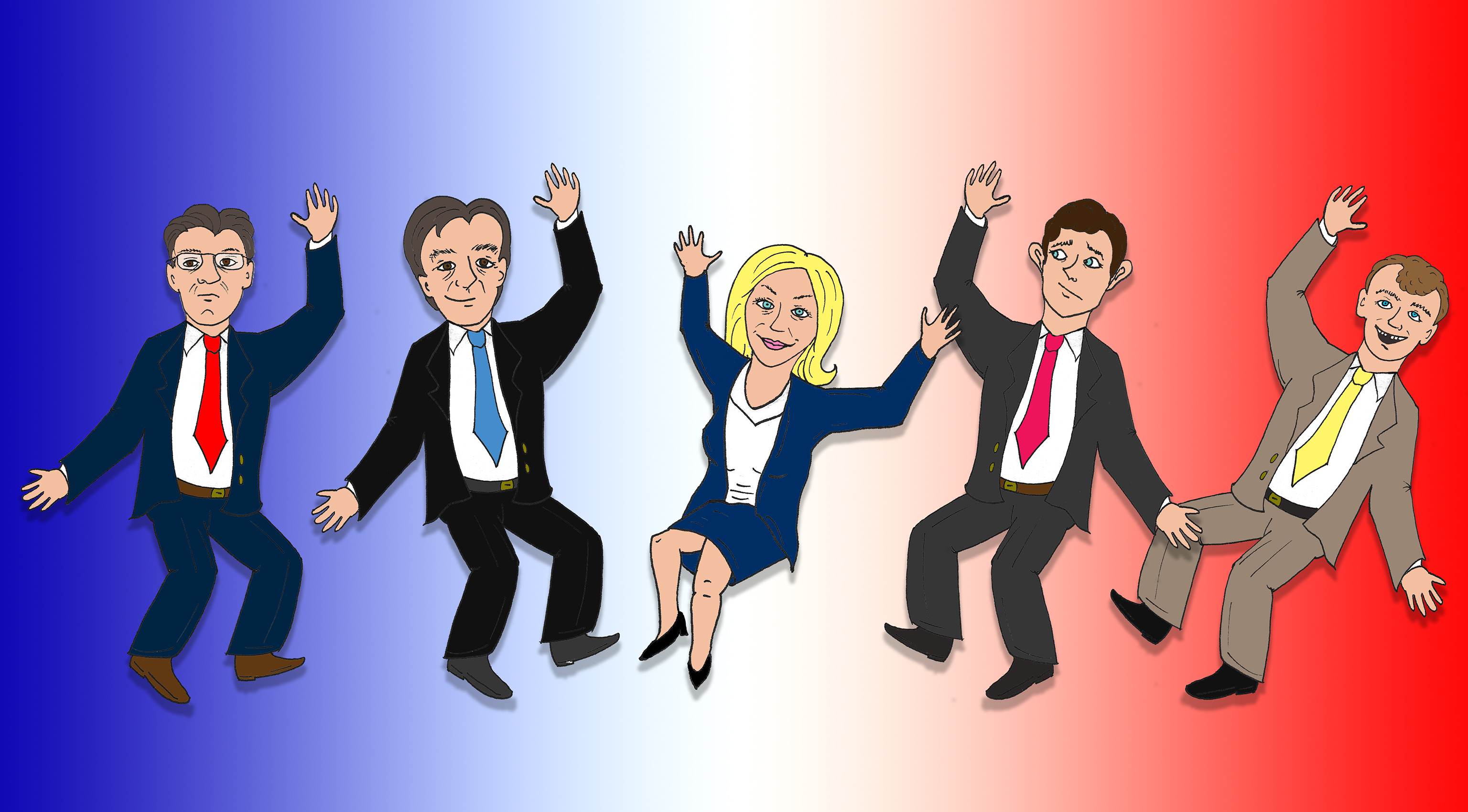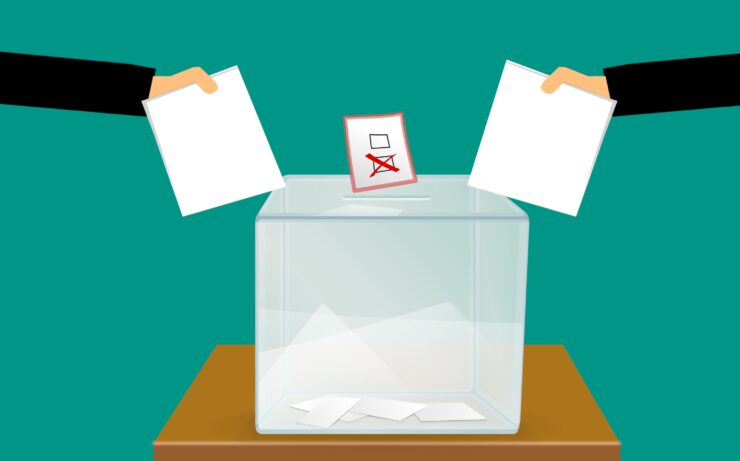The global impact of the upcoming French election
April 23, 2017—a date that might very well be the most important of the year. For it is on that day that the people of France will go to the polls, and vote in the first round of their presidential elections.
In a political atmosphere dominated by debates over identity, Europe, and populism, the election is still a toss up between five candidates, all polling above 10 per cent in the first round. Each candidate is taking advantage of the stormy state of European politics to promise voters a pot of gold.
France, a country of 66 million people and a $2.5-trillion economy, is organized politically under the semi-presidential Fifth Republic, with the executive power split between the president and the prime minister.
Unlike most other European republics though, where the president is a symbolic position, the French president has real power. For example, they have the authority to name ministers and other officials, they serve as commander-in-chief of the army, and they have the power to return laws to the National Assembly for another reading.
The president serves a five-year term, renewable once, and is directly elected. The elections are conducted under a direct run-off system, where, if no candidate gets at least 50 per cent of the vote in the first round, a second round is held between the top two candidates from the first round.
The current president, François Hollande is currently polling at record low numbers, which led him to not seeking a second term—a rarity for French presidents.
“Charisma, ethics and justice, setting the example: those should be what a country is looking for in a government,” said Alexandre Hénoud, a third-year student in translation at the University of Ottawa. Hénoud, who originally hails from Paris, said he’s “surprised at the fury” in France in these elections.
But even if the skies clear before election day, the way the voters will swing could be anybody’s guess.
The leprechauns
One of the names on everyone’s lips throughout the election cycle is, of course, Marine Le Pen of the right-wing National Front (FN). She’s the daughter of the party’s founder, Jean-Marie Le Pen, and took over the party in 2011 with the aim of detoxifying the party’s public image by tuning down some of the most overt extremism within the party and its platform. This included kicking out her anti-Semitic father from the party in 2015.
According to André Lecours, a professor of political studies at the U of O, the FN’s last strong showing was in the 2002 elections
“Even that year it wasn’t that really the Front Nationale had increased its support, it was rather that parties on the left were divided,” said Lecours. “So a scenario not unlike what we’re seeing this year.”
In her bid for the presidency this year, Le Pen has also adopted a new logo, branding her as just “Marine,” and with a blue rose. She is still very conservative, with a platform based on protectionism, nationalism, more government intervention in the economy, a referendum on French membership of the European Union (EU), democratic reform, severely curtailing immigration, and a tough-on-crime approach.
She has consistently led the polls for the first round, hovering around 30 per cent of the vote, but is projected to lose in the second round to Emmanuel Macron.
Hénoud points out that, often, as in the 2012 elections, “most people don’t vote for someone in the second round, and I don’t think we should have the same spirit in 2017.”
“The favourite now seems to be Emmanuel Macron,” said Lecours. “He’s really fracturing this kind of left and right divide which has really structured French politics ever since the French Revolution.”
A 39-year-old former banker, Macron had been the minister for the economy under President Hollande before quitting the government, and forming his own independent political movement En Marche!
Where Le Pen is from the far-right, Macron is an outspoken liberal centrist, strongly pro-European, socially liberal, and is also promising major liberalization of the economy, reforms to the French education system, and democratic reform. On the issue of immigration he also sits opposite of Le Pen, being solidly pro-immigration having said that German Chancellor Angela Merkel’s controversial decision to open her country’s borders to refugees “saved Europe’s dignity.”
Since declaring his candidacy he has risen steadily in the polls, to the point where he would now just finish first in the first round, and beat Le Pen in the second, with over 60 per cent of the vote.
Macron has been helped in his quest for the presidency by the fall of François Fillon, the Republican candidate. Fillon, a former prime minister under Nicolas Sarkozy often described as a Thatcherite, won a surprising victory in the Republican primary, easily beating the favourite and more moderate Alain Juppé.
After winning the nomination, he at first seemed like the favourite to win the presidency, but has since been hit by a series of scandals, and has been placed under formal investigation for allegedly having paid his wife and children hundreds of thousands of Euros for fake government jobs.
On the far left, the field is divided between two candidates: Benoît Hamon and Jean-Luc Mélenchon. Hamon, the Socialist Party candidate, comes from the left-wing of the Socialists, and is proposing a number of progressive measures such as a universal basic income, legalizing marijuana, and a robot tax.
Mélenchon, running with the recently formed Unsubmissive France movement, is a left-wing populist, calling for a Sixth Republic, more government intervention in the economy and is Eurosceptic. Hamon and Mélenchon are both hovering around 12 to 13 per cent each in the polls.
However, according to Lecours, the socialists won’t be a significant force in 2017.
“Right now the legacy of the President Hollande is not good for the socialist party, and maybe that’s why it’s a significant election, because it’s one of these rare time(s) we’re not going to have the moderate right against the moderate left.”
Crying lightning
No matter who you support in this race, April’s election is definitely a game of high stakes, since the results could lead to the unravelling of the European Union (EU) or give it a new lease on life.
“If you’re a Euro-enthusiast the worst result would be a Front Nationale president, because the Front has obviously expressed fairly harsh anti-EU rhetoric,” said Lecours.
In other words, a Le Pen victory could significantly weaken the EU, and if France was to leave the Euro or even the EU, it could prove fatal to the European project.
On the other hand, a victory by someone like Macron could significantly strengthen the EU, especially if paired with a pro-EU result in the German elections later in the year.
With Theresa May leading the United Kingdom out of the EU and facing the prospect of having to re-negotiate 40 years of deals and legislation with Europe and a trade deal with Canada, the U.K. could also face the secessions of Northern Ireland and Scotland. As a result, Canada risks having its hands full dealing with unstable European countries, and probably won’t benefit from France throwing itself into instability on top.
In fact, the effects of the election on the EU bring maybe the biggest potential impact for Canada. The EU is not only Canada’s second largest trading partner, but is it also one of Canada’s closest allies and friends on the world stage.
In addition, with the emboldened actions of Russian President Vladimir Putin and increasing Russian political aggression, a pro- or anti-Putin France could be a crucial factor in shapeshifting world order.
As well, a Le Pen government would be closer in ideology to Trump and Putin than to Prime Minister Justin Trudeau, so it would be expected that the current Canadian government would probably like to see someone other than Le Pen win.
Plus, Trudeau has already said as much in the past, calling for a strong EU and speaking out against Brexit.
Sunny Canadian ways?
The election could send shockwaves within Canada, as we also struggle with our views on identity, immigration, and populism. It’s tempting to see the state of politics today and conclude that the populist far-right is running towards inevitable victory.
One just has to look at Brexit and Trump, and, as Dr. Benjamin Zyla, a U of O professor of International Development and Global Studies, points out, “even Canada isn’t immune to those forces, as we see with the Conservative Party leadership race.”
Le Pen’s brand of populism has proved a significant force in Conservative circles in Canada, but she herself has failed to make a mark. Last year, when Le Pen visited Québec neither Premier Philippe Couillard or any of the opposition leaders chose to meet with her—a far cry from when President Charles De Gaulle visited Québec in 1967 and shouted “Vive le Québec libre!” to thunderous applause.
If Le Pen could make an impact in Canada though, it would probably be in Québec, a province where debates about identity are common and where the French-style secularization is viewed more favourably (as evidenced by the Charter of Values debate a few years ago). One theme in the election that Trudeau ought to watch out for in particular is the anti-establishment theme.
As the Trudeau government backed off from electoral reform, despite a solid pledge that was prominently featured in their election campaign, the Liberals risk undermining trust in government and in the political institutions of Canada. And when trust in government and political institutions is undermined, the potential for populism grows.
The recent popularity of Conservative leadership candidates Kellie Leitch and Kevin O’Leary provides a clear example of how this “anti-establishment” strain of populism is seeping into Canadian politics.
Lecours, on the other hand, is more skeptical about the impact of populism in Canada, mainly because Canada has a better integration system for immigrants.
“I think in Western Europe of course immigrants have not been well integrated, and part of this is because they don’t have the type of immigration system we have in Canada,” he said. “Canada takes immigrants who are fluent in English and in French, educated with a business plan.”
He notes that Canadian politicians have flirted with populist rhetoric in the past, specifically in regard to the Reform Party, but to no avail.
“Maybe times have changed, but I’m skeptical that this would play well in Canada.”
Pot of gold or pandora’s box?
These days, the news is dominated with headlines about the EU falling apart, refugee crises on a vast scale, economic depression, rampant racism and sexism, democracy fading away in Russia and Turkey, war and terrorism, and so on and so forth.
While worries abound that the French election could be the next domino to fall, it could also fit into the growing trend of a pushback against the populist far-right.
In the Netherlands the far-right Party for Freedom (PVV) had been leading in the polls for months. Yet, in the elections in mid-March, they finished a distant second to the ruling People’s Party for Freedom and Democracy (VVD). Even if the PVV did make gains, the biggest winners in the elections were the socially liberal and outspoken pro-EU parties Democrats 66 and the GreenLeft.
In Germany, Martin Schulz, former president of the European Parliament and outspoken pro-European, has injected new energy into the Social Democratic Party, and could very well beat Angela Merkel (hardly populist or extremist herself) in the German election in September.
With so much on the line, and with so much of the future that could be determined, Zyla said it is very important that younger voters turn out in large numbers.
“The youth vote will count. It could swing the pendulum.”
If anything, the success of Brexit and Trump have invigorated people around the world to stop the the thunder and lightning of populism from clouding their skies.
French citizens living in Canada can vote at the French Embassy here in Ottawa.
—With files from Nadia Drissi El-Bouzaidi.





